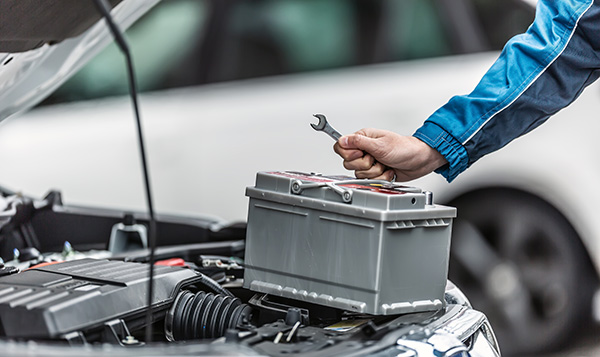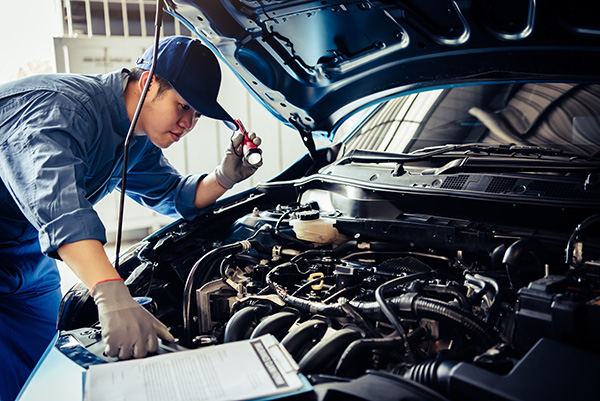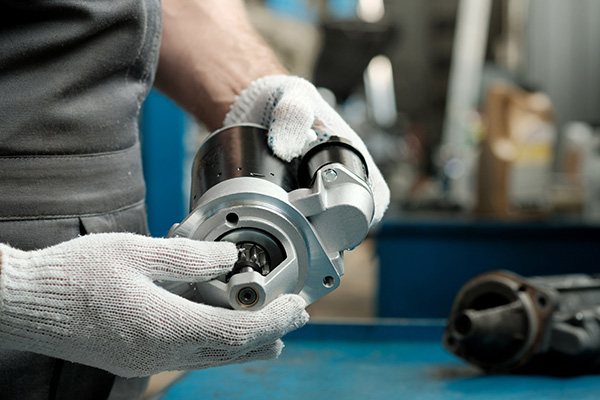Posted on 4/10/2025

If your steering wheel suddenly starts to feel off—maybe it shakes, pulls to one side, or just feels looser or stiffer than usual—it’s worth taking seriously. These changes don’t happen for no reason. In many cases, it’s a sign that something isn’t quite right with your alignment, suspension, tires, or power steering system. Steering isn’t just about comfort—it’s about control. And when that feeling changes, it’s your vehicle’s way of signaling a problem you shouldn’t ignore. So, what could be behind the difference you’re noticing? Vibrations at Certain Speeds If your steering wheel starts to shake or vibrate when you hit a certain speed—typically around 50 to 70 mph—it’s often a sign of wheel balance issues or uneven tire wear. When the wheels aren’t properly balanc ... read more
Posted on 3/21/2025

Written by Kukui, an Automotive Industry Leader When it comes to finding a trustworthy auto repair shop, reviews and ratings matter. You want a place that delivers excellent service, treats customers right, and consistently performs high-quality repairs. That’s exactly what the CARFAX Top-Rated Service Center designation represents. But what does it really mean for you as a vehicle owner? How Does a Shop Earn CARFAX Top-Rated Status Not every auto repair shop makes the cut. CARFAX, known for its vehicle history reports, also tracks service quality through verified customer feedback. Each year, they recognize repair shops that maintain outstanding ratings from real customers. To be named a CARFAX Top-Rated Service Center, a shop must consistently receive high marks for quality work, honesty, and customer service. For drivers, this means you don’t have to take a gamble on where to bring your car. A CARFAX Top-Rated shop has already been vetted by other ca ... read more
Posted on 2/24/2025

No car engine lasts forever. Over time, wear and tear take a toll on vital components, leading to performance issues, excessive oil consumption, or even complete engine failure. While minor problems can often be fixed with standard repairs, there comes a point where an engine overhaul is the only practical solution. But how do you know when that time has come? Recognizing the signs of a failing engine early can help you make an informed decision before you find yourself stranded with a car that won’t start. Signs Your Engine May Need an Overhaul Engines give off plenty of warning signs before they reach the point of complete failure. Ignoring these symptoms can lead to more damage and higher repair costs. If you notice any of the following issues, it might be time to consider an overhaul. Persistent Loss of Power Engines lose efficiency as they age, but if your car struggles to accelerate, feels sluggish, or has difficulty maintaining speed, i ... read more
Posted on 2/24/2025

Cold weather is often the culprit behind car batteries suddenly giving out. Have you ever tried to start your car on a frosty morning, only to hear the dreaded click of a dead battery? When temperatures drop, car batteries face unique challenges that can lead to unexpected failures. Let’s see why this happens and what you can do to keep your vehicle powered through the winter months. The Science Behind Car Batteries and Cold Weather Car batteries rely on chemical reactions to generate the power your car needs to start and operate. These reactions slow down significantly in colder temperatures, making it harder for the battery to produce enough energy. At 32°F, a battery's power output drops by about 20%, and at 0°F, it loses up to 50% of its strength. This reduced output, combined with the higher demand placed on the battery during cold starts, can expose a worn out battery that was working fine in the summer, often leading to failure to start ... read more
Posted on 2/14/2025

SUVs are known for their durability, power, and versatility, making them a popular choice for families, adventurers, and everyday drivers alike. But like any vehicle, even the toughest SUV requires proper care to keep running efficiently and avoid major breakdowns. If you want your SUV to remain reliable for years to come, following a few key maintenance habits is necessary. Taking the right steps can help you maximize your vehicle’s lifespan while avoiding common issues that may cut its life short. Stick to Regular Oil Changes One of the simplest yet most crucial ways to keep your SUV in top condition is by sticking to a consistent oil change schedule. Oil is the lifeblood of your vehicle’s engine, lubricating its moving parts and preventing overheating. Over time, oil becomes dirty and less effective at reducing friction. Ignoring regular oil changes can lead to engine wear, decreased performance and fuel economy, and even costly engine repairs down the ... read more
Posted on 12/12/2024
%20-%20Copy%201.png)
100k miles is commonly thought of as the major service for every vehicle but what does that entail? What are the benefits and what happens if it's not done? What is the 100k service? The 100k service is the service that is done at 100,000 miles, but seriously though, what is it? The services recommended by the manufacturer at 100k vary by vehicle but some common examples are spark plugs, fuel system/induction cleaning service, timing belt, valve adjustment and more. Some vehicles have their major service slightly offset from 100k miles in order to make them coincide with a regular oil change. It is always best to consult your owners manual or a trusted automotive repair shop to find out what is recommended for your vehicle, but here is a common example: 2012 Honda Pilot 105k Service Replace Spark Plugs Replace Timing Belt Inspect and Adjust Valve Clearance Replace Automatic Transmission Fluid Replace Engine Oil and Oil ... read more
Posted on 12/11/2024

Fleet maintenance is often perceived as an additional expense, but it's actually a smart investment that can save you money in the long run. In this article, we'll explain the economic benefits of fleet maintenance and how it contributes to significant cost savings over time. The True Cost of Neglect Neglecting fleet maintenance may seem like a cost-saving measure in the short term, but it can lead to a myriad of expensive problems down the road. From unexpected breakdowns and significant repairs to vehicle downtime and lost productivity, the financial consequences of neglecting maintenance can quickly escalate. Proactive vs. Reactive Maintenance One of the key principles of fleet maintenance is the distinction between proactive and reactive approaches. Proactive maintenance involves regularly scheduled inspections, servicing, and preventive measures to address potential issues before they escalate. On the other hand, reactive maintenance e ... read more
Posted on 12/2/2024

When it comes to driving in Maryland, car safety isn’t just a personal priority—it’s a legal requirement. Whether you’re relocating to the state, purchasing a used vehicle, or simply want to ensure your car is safe for everyday use, the Maryland Safety Inspection (MSI) has a pivotal role. More than just a formality, this inspection helps guarantee that all vehicles meet the necessary safety standards, protecting not only you but everyone on the road. So, what makes the Maryland Safety Inspection so important? Let’s explore its significance, the process involved, and the benefits of choosing a reliable shop to handle it for you. The Legal Requirements of Maryland Safety Inspection Maryland law requires that all vehicles undergo a safety inspection before they can be registered and legally driven on state roads. For residents moving to Maryland or buying a used car within the state, this inspection is mandatory and ensures that ... read more
Posted on 10/23/2024

Starting your car is something most of us take for granted. You turn the key or press the button, and the engine roars to life. But what happens when you turn the key and nothing happens? One possible culprit could be a failing starter motor. The starter motor is responsible for cranking the engine, and when it goes bad, you’ll find yourself stuck with a vehicle that just won’t start. So, how can you tell if your starter motor is on its way out? For a video on how the electrical system and starter motor works, skip to the bottom of this page.1. The Engine Won’t Turn Over This is perhaps the most obvious sign. When you attempt to start your car and the engine won’t turn over, it's likely that the starter motor isn't working. You might hear a clicking noise, which is often a sign that the starter is trying but failing to engage. In some cases, you w ... read more
Posted on 9/10/2024
.jpeg)
You're cruising down the open road, the wind in your hair and the hum of the engine beneath you. But amidst this motion, a question lingers: When was the last time you treated your vehicle to a transmission flush? How Often Should You Flush Your Transmission? The first order of business in the transmission flush saga is deciphering the ideal frequency for this maintenance procedure. While opinions may vary among experts, a general consensus suggests that a transmission flush is typically recommended every 30,000 to 60,000 miles. However, it's essential to consult your vehicle's owner's manual and consider factors such as driving habits, terrain, and the age of your vehicle when determining the appropriate interval for a transmission flush. The Importance of Transmission Flush Now, let's shine a spotlight on the significance of a transmission flush in maintaining the health and longevity of your vehicle's transmission s ... read more